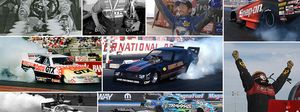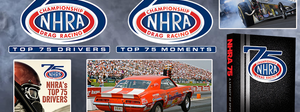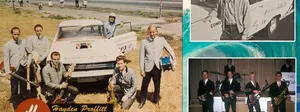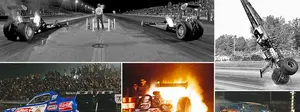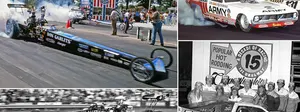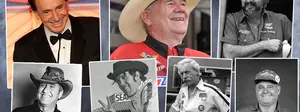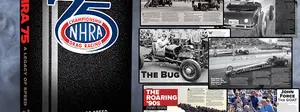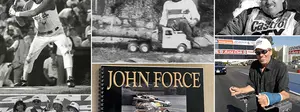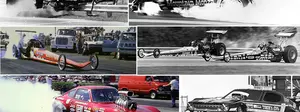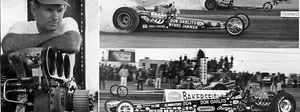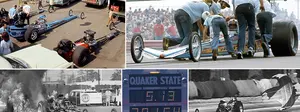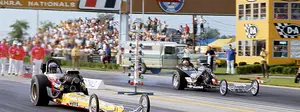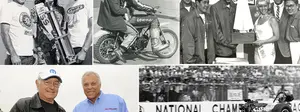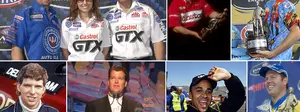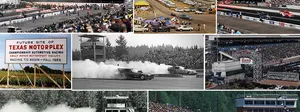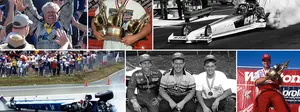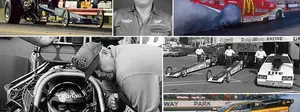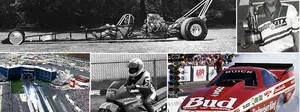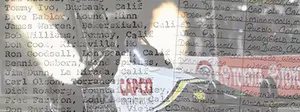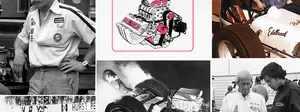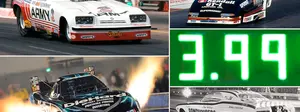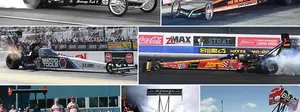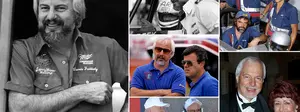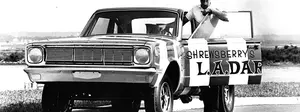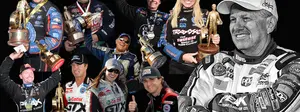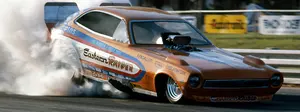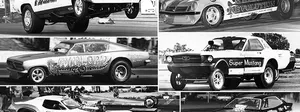An irrepressible Force
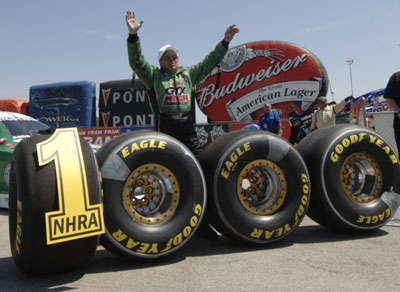 |
I was never all that good at math in school, but you don’t have to be a quantum physicist to calculate that John Force had to average about two round-wins in each of his 501 starts to reach the 1,000-win plateau he crested with his first-round victory at the O’Reilly NHRA Midwest Nationals presented by Castrol. That’s an average of a semifinal appearance each time out, which is pretty damned impressive in my books.
Doing 1,000 of anything successfully – whether it’s 1,000 trips to the grocery store without bashing into a shopping cart or changing 1,000 diapers – is quite an accomplishment, but when it means muscling a short-wheelbased, 7,000-horsepower, rolling time bomb to the end of a 40-foot-wide, quarter-mile-long ribbon of concrete and asphalt ahead of the racer in the other lane trying to do exactly the same thing, it’s REALLY something. Most drivers don’t have 1,000 runs under their belt – including in qualifying – let alone 1,000 winning passes.
Considering that he started from nothing and won just 14 rounds in his first 22 events in his first five abbreviated campaigns, ending up with 1,000 in 501 is astonishing. Consider this as well: In 125 of those 501 starts, he won all four rounds available, so one should easily be able to deduce that he had a lot of first-round losses to balance it out. But, as we know, he gutted it out and eventually became the sport’s biggest winner, and the rest is history, right?
Lately, though, things have been a little tougher for him, which is why I really liked his quote from the press release after he recorded that 1,000th win: “Winning a thousand rounds, that means that at a point in time, we were pretty good!”
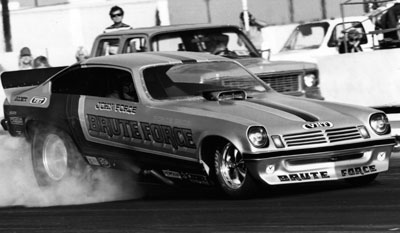 |
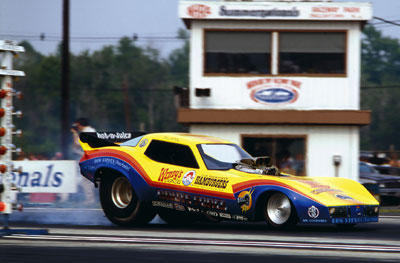 |
It was a humble Force, a true-to-himself-and-his-fans Force because he knows he hasn’t won as he used to. He knows he hasn’t been in the winner’s circle to hold the trophy since Brainerd last year. He knows that a year from now he’s going to be 60 – still young for a drag racer, but feeling old in the bones, especially the sore ones he has now.
But even if he somehow thinks his glory days are behind him, I’d invite him to put a little Toby Keith in the CD player and sing along: “I ain’t as good as I once was, but I’m as good once as I ever was.” That's how John Force is, and there's not a Funny Car racer in the pits who doesn't fear him as much now as ever.
As we all know, he didn't reach 1,000 wins by accident or by luck.
To have any modicum of success while you’re trying to come up through the ranks -- barnstorming the country, living on burgers and beans five to a room, trying to build a name, find a sponsor, and keep the rods from coming out of not just your engine but your personal life -- takes dedication.
But he made it through to the other side. We all know the stories: polio in youth; sharing an impossibly small trailer with his parents and four siblings; quarterback of a high school football team that never won a game; truck driver; how he used a tax-refund check and the sale of a prize that his mother-in-law had won on a game show (an organ) to buy his first race car; cars that usually had more oil underneath them than in them; doing anything for a buck, even dressing up as little red-haired, pigtailed Wendy to satisfy his sponsor; nine straight runner-ups without a win.
And sometimes it's not much easier today, mentally at least. To continue to stay after it 30 years later while not only running a multimillion-dollar business and nurturing protégés – three of which are your daughters, all of whom will be winners – but also while keeping the world safe for democracy and nurturing an ever-growing fan and sponsor base and dealing with a gazillion people who all want “just five minutes” of your time and attention AND dealing with your own demons … well, not many people could be John Force.
A lot of people would like to be John Force, but only because they don’t know how hard it is to be John Force.
I’m not talking about how he has a mean limp right now after his crash last September or how, like any dad, he’ll fret when his daughters drive to the mall let alone to the big end. For all of his successes – Wally trophies and championships that overflow his headquarters, adoring fans, TV shows, media appearances, and all of the other trappings of success – I feel as if he’s a bit of a tortured soul sometimes. For all that drag racing has given him, it’s also taken from him. It has cost him sleep, hair, stomach upset, and peace. For a while, it claimed his marriage, and it took Eric Medlen for all time. That one still hurts and will for a long time.
And for all that he has given drag racing – a modern-day hero, a Don Garlits for this generation of fans, and an inspirational success story to kids everywhere that, yes, you can grow up poor and still become a champion, on and off the track – it still feels to me as if he thinks that’s not enough.
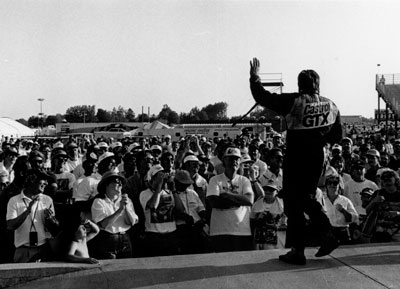 |
I’m not going to pretend to be in John Force’s inner circle, but throughout the years, we’ve become good friends, and he knows he can call me anytime, any day to talk about what’s on his mind. I’m under standing orders to call him if ever I get wind that the fans are turning against him for any reason so he can “fix it.” He calls sometimes just to chat about our first grandchildren, who are roughly the same age. My grandson Jaden shares John’s birthday, which was yesterday. Sure they’re separated by 55 years, but he brings them closer every time we talk.
And then sometimes, sometimes … he just needs to talk, as he did Tuesday after Ashley had won in Atlanta. He picked up the phone in the middle of the night wherever he was, and though he had every right and opportunity to talk about how he had turned another raw rookie into a national event winner, he left a very long, personal, and emotional voice mail.
He couldn’t sleep, he said, so he got up, put on his robe and his ever-present Castrol hat, and prefaced his message with the caveat that “this probably won’t make any sense, because it doesn’t make any sense to me … maybe I ate too many pickles for dinner” and continued to talk until the voice-mail-message limit cut him off. Then he called back and talked some more.
With all that he has already given us – new sponsors, big sponsors, safety innovations, technological centers, major media exposure, reality TV shows, Robert and Eric and Ashley, and so much more – he still has more work to do before he pulls that last parachute. He wants to ensure that the much-publicized next generation has the tools and the support to keep this ol' hot rod of a sport going strong. He sees us lose pioneers of the sport -- much like we could have lost him last year -- and he's thinking of ways he can help. Me, I think he thinks too much. I know he probably reads too much into dreams and visions and subconscious and that he lies in bed for hours trying to figure out what it all means, how he can save the world.
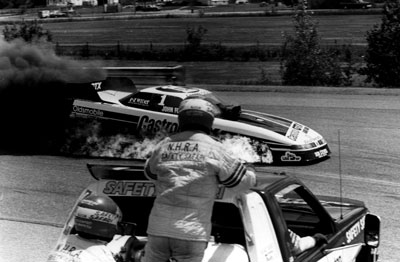 |
Sometimes he throws money at the problem, sometimes people and technology, but mostly it’s just his heart and his soul. I remember making a special trip to watch him in Noble, Okla., in 1992 at a Division 4 points meet. He was fresh off the “I saw Elvis at 1,000 feet" episode in Memphis and worried about the future. He rolled into Noble with a car that was built like a tank, a Funny Car From Hell aimed at him never having to go there again at a time when he was the class leader in fireballs. It had a spare parachute mounted under the body. After noting that his car had pivoted on the oil pan in the Memphis fire after the tires had blown, he had six-inch billet aluminum wheels welded to the bottom of the chassis to keep ‘er rolling straight. He had small aluminum wings in front of the butterfly steering wheel, precursors to today’s “doghouses.” It had a ginormous parachute-deployment button on the inner roof instead of the traditional smaller handles. He had a button to trigger the fire bottles instead of the traditional extra handle on the brake handle that forced a driver to momentarily stop pulling on the lever to activate.
And, of course, the pièce de résistance, a full-blown, 007-worthy, body-ejection system to cast off the burning shell if things got really ugly. Triggered by another button, it would unlatch the front catch that held the nose of the body to the chassis, then a pair of large cylinders would lift the nose of the body a foot off the chassis, where the wind could catch it and flip it off the car. The body was tethered to the chassis with a 20-foot steel aircraft cable.
I don’t remember the thing ever getting a trial by fire, so to speak, and it was so ungodly heavy that Austin Coil ditched it not long after, but the thought process was there. It was Force trying not just to save his own bacon from the fire, but that of others in the class. He did it again last year, in the wake of the Medlen tragedy, throwing everything he had in his arsenal at it -- money, expertise, people, technology – and collaborating with NHRA and manufacturers and other racers to build a better mousetrap and to build a foundation in Eric’s name. It’s part penance and part his nature.
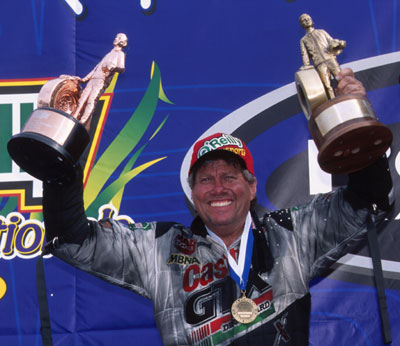 |
“I help as I can,” he told me simply once. “I like to help. I’m just trying to sort out my life and what really matters.”
Even though he has already given the sport so much, I feel as if he thinks his work isn’t done, as if he owes the sport still more. It’s a tremendous burden he places on himself.
Force can be a powerful ally, and he knows it. He commands respect and possesses power and influence within the sport. Everyone wants him on his or her side, and sometimes he’s the unwilling rope in political tugs of war. But not only does he want to help, I think he feels he needs to. That’s why he’ll “work the ropes” until he’s dead tired and hand-cramped, why he’ll grab onto that already-dialed cell phone that some fan just handed him so he can talk to some sick kid or some fan’s buddies at the bar, and he’ll do it with a smile on his face, because that’s what important to him.
What matters to John Force is me and you and anyone else who has ever cheered louder than a nitro car. What matters is family. What matters is the sport and the people in it, and that they all get to go safely home to their families at night. What matters is not just that our sport has a future, but that it has a bright one.
What John Force has accomplished in our sport will never be matched, and I’m not just talking about the 1,000 wins or the rest of his untouchable records. I’m proud to work with him, to watch him do his thing, and to call him a friend.
Congratulations, John. Take a week off, will ya?



